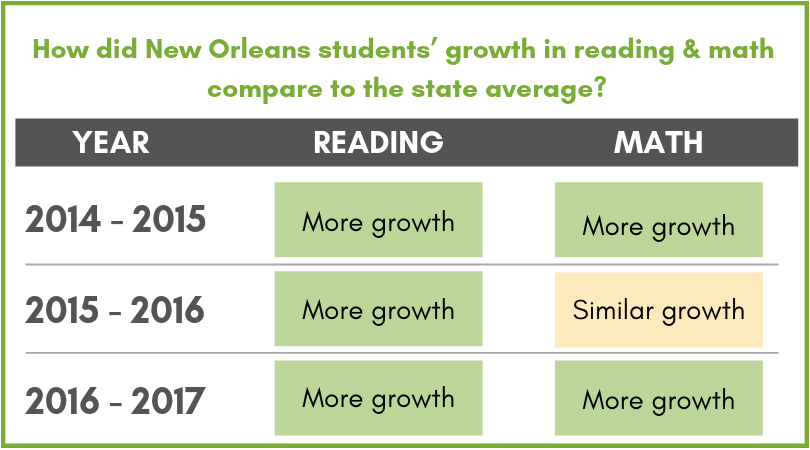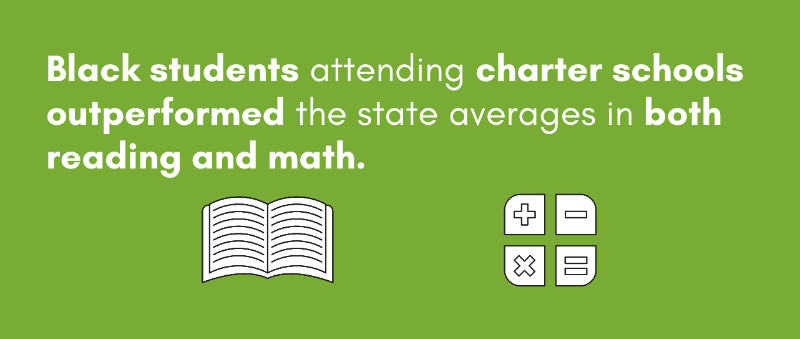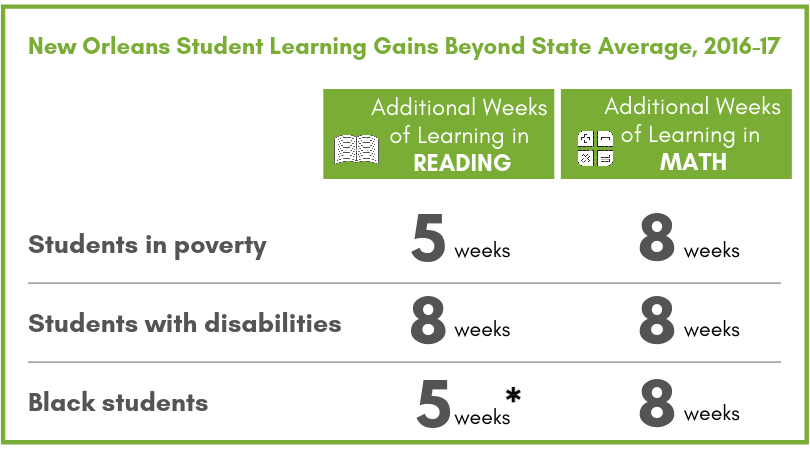Our students deserve quality schools where they are challenged and supported, and where they can learn and grow. In Louisiana, the two main ways we measure school performance are students’ achievement and their growth.
Academic achievement is defined as students’ mastery of certain learning standards, as measured by their performance on an assessment at a single point in time. It reflects how well a given student is prepared for the next level of study. Academic growth, also referred to as academic progress or learning gains, refers to students’ improvement from one year to the next.
A new report from Stanford University’s Center for Research on Education Outcomes (CREDO) focuses on growth, and tells us that New Orleans children are demonstrating incredible academic progress. In both reading and math, our students are growing more each year than the state average.
CREDO’s “City Study 2019: New Orleans” is part of their City Studies series, which examines the academic performance of public schools in ten cities nationwide between 2014 and 2017. For each city, CREDO compares students’ yearly academic growth with the average learning gains of the state in which the city is located. In addition to measuring the performance of public schools across the city as a whole, CREDO breaks down results by subject — reading and math — as well as student subgroups, such as race and economic status.
Compared to the other cities that CREDO studied and has released findings for thus far, New Orleans is the only city that outperformed its state in both subjects for the majority of years studied. New Orleans is also the only city where Black students, students in poverty, and students with disabilities outperformed their peers statewide in 2016-17.
New Orleans Students Show More Academic Growth than State Average Overall
For two out of the three school years studied, New Orleans students demonstrated greater learning gains in both reading and math compared to the average learning gains of Louisiana as a whole.
Reading
In reading, New Orleans students showed more growth each year between 2014 and 2017 than the state average learning gains.
Math
In math, New Orleans students made greater learning gains than the state average for the 2014-15 and 2016-17 school years. In 2015-16, New Orleans’ gains were similar to the state average.
A Closer Look at Outcomes for Students in Historically Underserved Groups
CREDO examined the 2016-17 school year performance data for specific groups of students in New Orleans compared to groups of the same types of students statewide.
Black Students
In math, Black students attending all types of New Orleans public schools grew more than the average for Black students statewide. In reading, the yearly growth of Black students was similar to the state average. Black students attending public charter schools in New Orleans, however, outperformed the state averages in both subjects; and over 90% of Black public school students in New Orleans attended charters in 2016-17.
Students in Poverty
In both reading and math, students living in poverty in New Orleans grew more than the state average for students in poverty.
Students Receiving Special Education Services
Students receiving special education services also grew more in both reading and math than the state average for students receiving these services.
*The study did not find this result to be statistically significant. All other results are statistically significant.
Hispanic/Latinx Students
Hispanic/Latinx students in New Orleans had similar growth to the state average for Hispanic/Latinx students in both reading and math.
English Language Learners
New Orleans students who are English Language Learners also had similar growth to the state average for English Language Learners.
Looking Ahead to Continued Progress
The results in CREDO’s report demonstrate the undeniable hard work of our students and educators.They also highlight the fact that Black, low-income, and students receiving special education services in New Orleans have made significant gains. We must be mindful of both historical and current systemic inequities as we work to move generations of children toward mastery of academic standards, and ultimately, true readiness for college and career.
The CREDO report marks strong forward motion. At the same time, it is also a reminder that we must build on our shared work of continuous improvement and collective innovation; together, we will create more excellent schools and sustain existing ones. This work is challenging, but we are hopeful; we are making steady progress toward our goal of a great education for every child.
To learn about additional findings in CREDO’s New Orleans study, download the full report.




